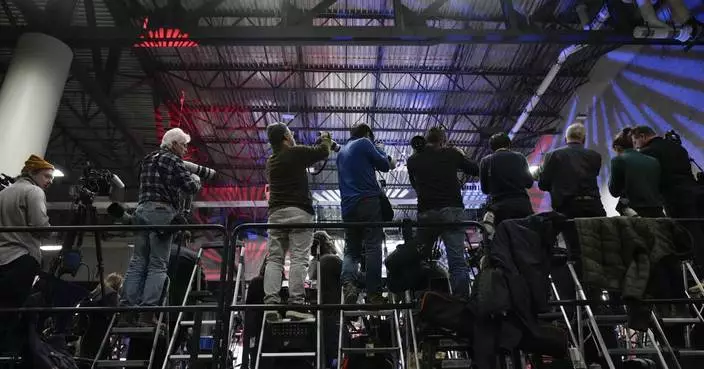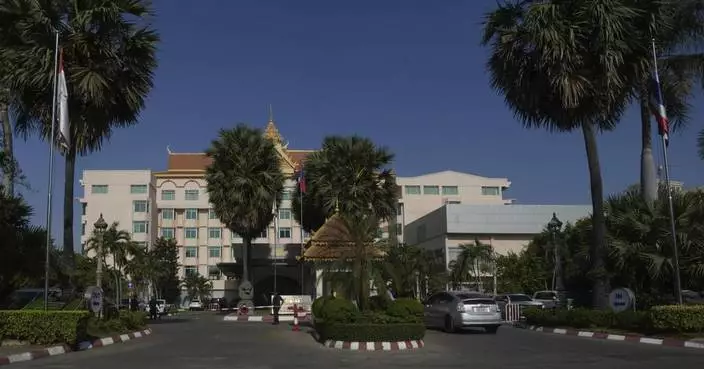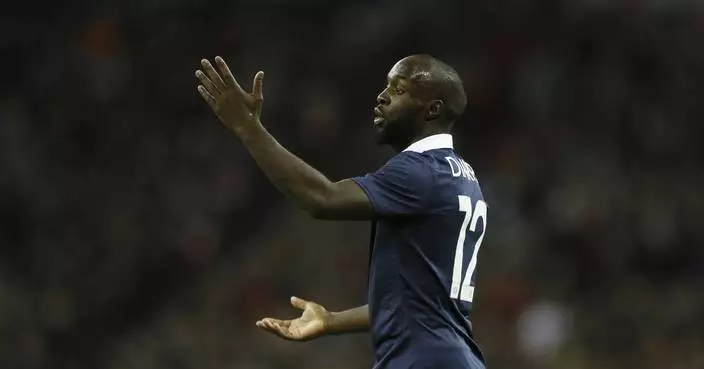A Darth Vader costume, playground equipment, pastries and boxes of food all are part of an exhibit at Ukraine's National History Museum displaying the colorful behavior and sometime-questionable practices that characterize the country's elections.
The exhibition, called "The Museum of Election Trash" was put together ahead of Sunday's snap parliamentary elections.
Unlike elections in neighboring Russia, campaigns in Ukraine tend to be lively, and the seriousness of some candidates is open to question.
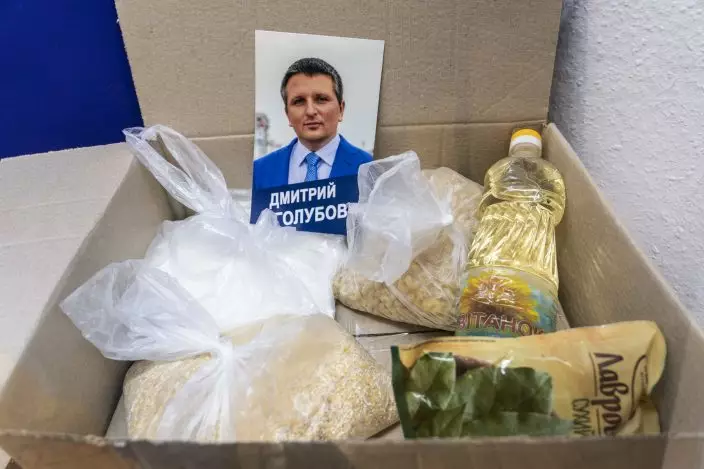
In this photo taken on Friday, July 12, 2019, a portrait of a candidate, packets of grains and food are displayed in an exhibition at the National History Museum, in Kiev, Ukraine. A Darth Vader costume, playground equipment, pastries and boxes of food all are part of an exhibit at Ukraine’s National History Museum displaying the colorful behavior and sometime-questionable practices that characterize the country’s elections. The exhibition, called “The Museum of Election Trash” was put together ahead of the snap parliamentary elections on Sunday, July 21, 2019. (AP PhotoEvgeniy Maloletka)
One of those in this year's election is Darth Viktorovich Vader, who is running for a seat in Odessa. This is only the latest appearance of the Star Wars villain — another Darth Vader ran for president in 2014.
The Star Wars theme continues this year with the election being widely called "Battle of the Clones," a reference to the fact that many candidates are mimicking the still-popular recently elected President Volodymyr Zelenskiy and his Servant of the People party.
At least 86 candidates have listed in their bios that they are a "Servant of the People" though they have nothing to do with the president's party. And eight Zelenskiys are running — admittedly it is a fairly common name.
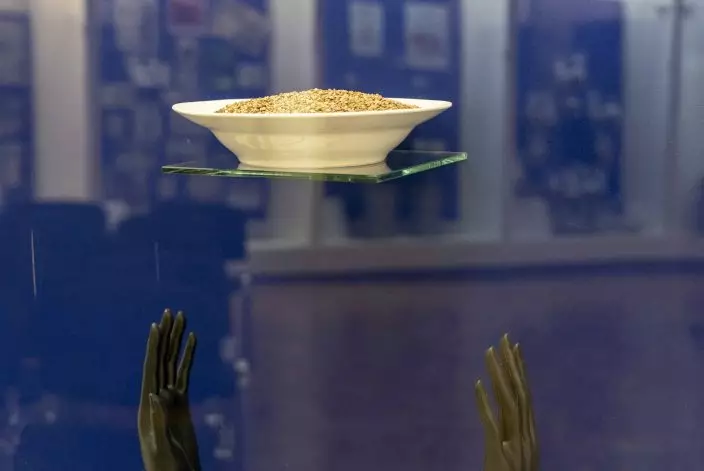
In this photo taken on Friday, July 12, 2019, a bowl of buckwheat is displayed in an exhibition at the National History Museum, in Kiev, Ukraine. A Darth Vader costume, playground equipment, pastries and boxes of food all are part of an exhibit at Ukraine’s National History Museum displaying the colorful behavior and sometime-questionable practices that characterize the country’s elections. The exhibition, called “The Museum of Election Trash” was put together ahead of the snap parliamentary elections on Sunday, July 21, 2019. (AP PhotoEvgeniy Maloletka)
Though Zelenskiy, a former TV comic who won by a landslide in April to become president, is expected to win handsomely, he has recorded a video statement, urging voters to be careful not to vote for the copycats.
Election officials just shrug their shoulders.
"The law unfortunately has no restrictions for those who are trying to confuse the voters," says Volodymyr Vyrva, spokesman for the Central Election Commission. "There's nothing we can do."
The "electoral trash" exhibit also highlights candidates' efforts to influence voters through gifts. The items include colorful equipment for a town playground that one candidate provided before an election, along with pastries and boxes of foodstuffs handed out to voters.
Museum employee Yulia Reshitko says such bribery will remain a feature of Ukrainian elections so long as millions of people struggle to make ends meet. The latest trend is providing free tickets to pop gigs or classical music concerts.
"People were happy with the food boxes before," she said.
Zelenskiy's successful transformation has encouraged others. Svyatoslav Vakarchuk, for example, is the leader of the new Golos party — and arguably the nation's most beloved rock star.
"Political extravaganza is part of the Ukrainian tradition where politicians have often resorted to various attention-grabbing antics," says Kiev-based political analyst Volodymyr Fesenko. "But the extravaganza does not always produce good results."
In 2010, a western Ukrainian man who changed his last name to "Protyvsikh" which translates into English as "Against Everyone" ran for president and won just 0.2 percent of the vote.
BEIRUT (AP) — The European Union announced Thursday an aid package for Lebanon of 1 billion euros — about $1.06 billion — much of which will go to boost border control to halt the flow of asylum seekers and migrants from the small, crisis-wracked country across the Mediterranean Sea to Cyprus and Italy.
The deal follows other EU aid packages for countries such as Egypt, Tunisia and Mauritania to fortify their borders. It comes against a backdrop of increasing hostility toward Syrian refugees in Lebanon and a major surge in irregular migration of Syrian refugees from Lebanon to Cyprus.
European Union Commission President Ursula von der Leyen said during a Beirut visit with Cypriot President Nikos Christodoulides that the aid distribution will start this year and last till 2027.
The bulk of the aid — 736 million euros — would go to support Syrian refugees “and other vulnerable groups” in Lebanon, while 200 million euros are meant to bolster Lebanese security services in enforcing border and migration control, according to figures provided by the Cypriot government.
An unspecified amount would go to Lebanese fishermen, to discourage them from selling their boats to smugglers.
Von der Leyen said the EU will also work on a “more structured approach to voluntary return" of Syrian refugees "in close cooperation with” the U.N. refugee agency. The bloc will continue to maintain “legal pathways” for resettlement of refugees in Europe, she said.
Lebanon's caretaker Prime Minister Najib Mikati praised the package, saying that “Lebanon’s security is security for European countries and vice versa,” and that an escalation of the crisis ”will not be limited to Lebanon but will extend to Europe."
Lebanon, which has been in the throes of a severe financial crisis since 2019, hosts nearly 780,000 registered Syrian refugees and hundreds of thousands more who are unregistered, the world's highest refugee population per capita.
Lebanese political officials have for years urged the international community to resettle the refugees in other countries or assist their return to Syria — voluntarily or not. Lebanese security forces have stepped up deportations of Syrians over the past year.
Tensions further flared after an official with the Christian nationalist Lebanese Forces party, Pascal Suleiman, was killed last month in what military officials said was a botched carjacking by a Syrian gang. The incident prompted outbreaks of anti-Syrian violence by vigilante groups.
Meanwhile, Cypriot authorities complain the island nation has been overwhelmed by irregular migration of Syrian asylum seekers, many of them coming on boats from Lebanon.
The UNHCR in Lebanon said it had verified 59 “actual or attempted” departures by boats carrying a total of 3,191 passengers from Lebanon between January and mid-April, compared to three documented boat movements carrying 54 passengers in the same period last year. Usually, few boats attempt the much more dangerous crossing in the winter. In all of 2023, UNHCR recorded 65 boat departures carrying 3,927 passengers.
Cyprus has taken a new approach to halting the flow of migrants. Last month, it suspended processing of Syrian asylum applications, and human rights groups accused the Cypriot coast guard of forcibly turning back five boats carrying about 500 asylum seekers coming from Lebanon. Cypriot officials have denied this.
Bassel al-Shayoukh, a Syrian refugee from Idlib living in Lebanon since 2014, said his brother and several cousins and nephews were on one of the boats turned back. Now he wants to make the journey himself.
“In the beginning I thought that in a year or two the war would be over in Syria,” he said, but it dragged on, while in Lebanon “every year ... the situation began to get worse.”
Shayoukh said he fears being beaten by vigilantes or deported to Syria after Lebanese authorities declined to renew his residency permit.
His 17-year-old nephew, who declined to give his name fearing for his safety, said the Cypriot coast guard started making waves to push the boat he was on away. “I was terrified... I don’t know how to swim,” he said. “I thought we were going to die.”
The people on the boats “stayed three days without food or water” before turning back to Lebanon, the teen added.
Back in Lebanon, they were detained by the army; those registered with UNHCR were released and the others deported.
Mohammed Sablouh, a Lebanese human rights lawyer who works on refugee and migrant cases, says Lebanese authorities are deliberately “turning a blind eye" to the surge in migration to "pressure the international community.”
The Lebanese army did not respond to a request for comment on their measures to combat smuggling.
Thursday's aid announcement comes ahead of the annual fundraising conference for the Syrian crisis in Brussels later this month. After 13 years of civil war, donor fatigue has set in while the world’s attention is occupied by the humanitarian fallout of more recent conflicts in Ukraine and Gaza.
The Cypriot president said Thursday was a “historic day” and called for European officials to go farther and declare some areas of Syria safe for return.
“The current situation is not sustainable for Lebanon. It is not sustainable for Cyprus, it is not sustainable for the European Union,” Christodoulides said.
But not all Lebanese officials are convinced the European aid would solve the problem.
Lebanese Forces party head Samir Geagea told The Associated Press earlier this week that European authorities are mainly concerned “that the refugees don’t go to Europe."
"For us the problem is that we cannot have our country drowning in illegal Syrian refugees,” Geagea said, urging for Syrians to be sent back to either government or opposition-held areas of the neighboring country.
But Shayoukh says he has nowhere to go.
The Damascus government wants him for opposing Syrian President Bashar Assad, he said, while the Islamist group that now controls his hometown behaves "the same way as the regime’s intelligence services” in crushing dissidents.
Associated Press writer Menelaos Hadjicostis in Nicosia, Cyprus, contributed to this report.
Follow AP’s global migration coverage at: https://apnews.com/hub/migration

Lebanese caretaker Prime Minister Najib Mikati, center, speaks during his meeting with Cyprus' President Nikos Christodoulides, left, and President of the European Commission Ursula von der Leyen at the government palace in Beirut, Lebanon, Thursday, May 2, 2024. (AP Photo/Hassan Ammar)
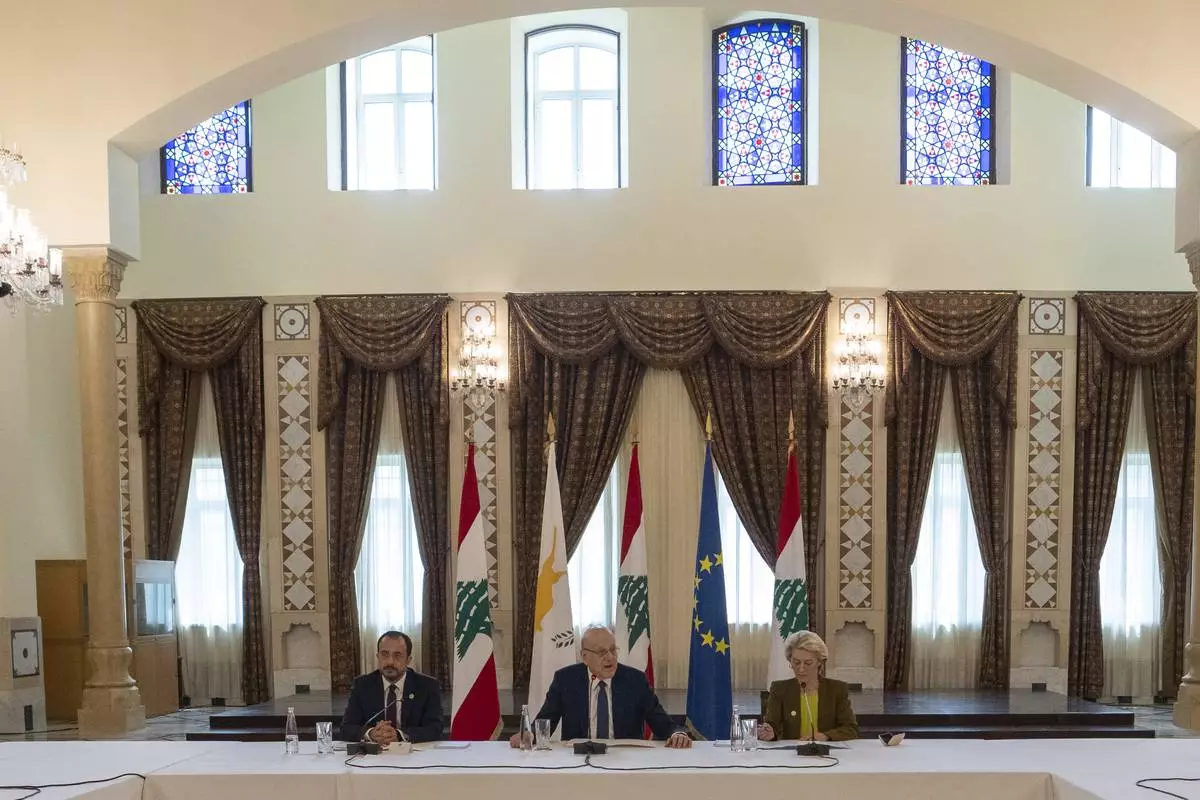
Lebanese caretaker Prime Minister Najib Mikati, center, speaks during his meeting with Cyprus' President Nikos Christodoulides, left, and President of the European Commission Ursula von der Leyen at the government palace in Beirut, Lebanon, Thursday, May 2, 2024. (AP Photo/Hassan Ammar)
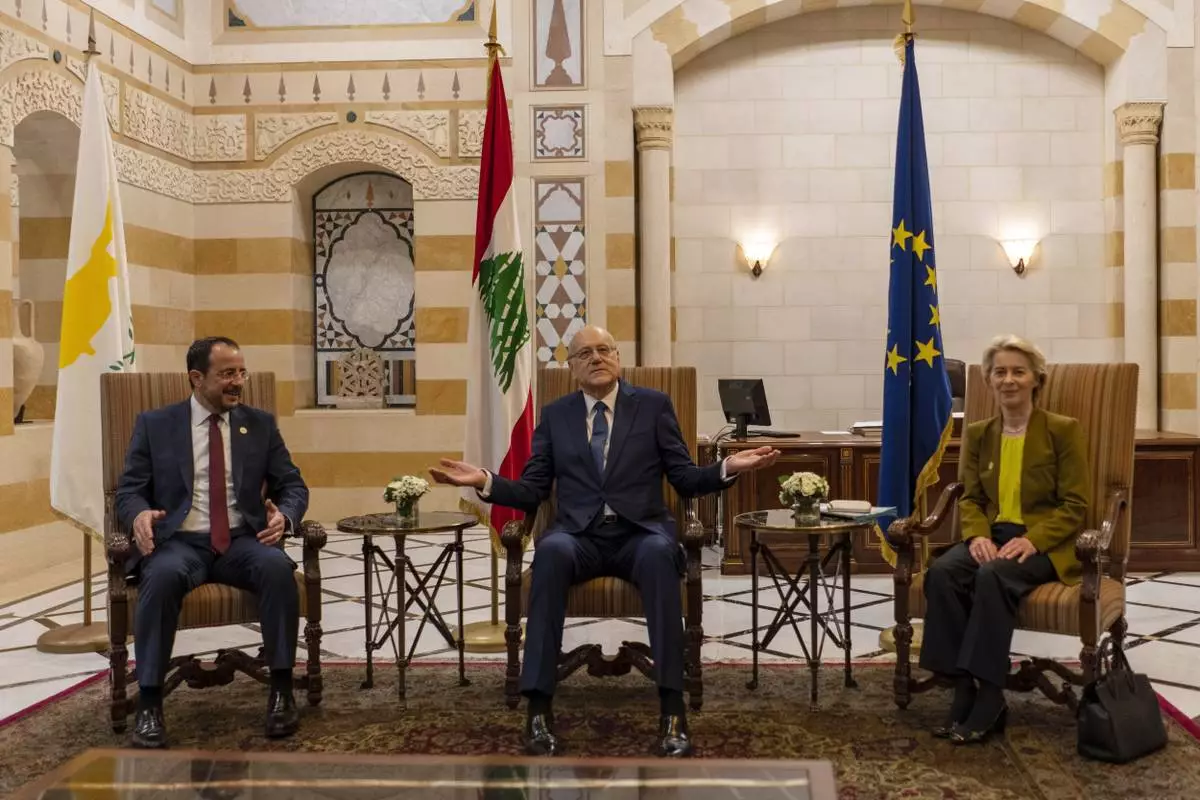
Lebanese caretaker Prime Minister Najib Mikati, center, welcomes Cyprus' president Nikos Christodoulides, left, and President of the European Commission Ursula von der Leyen before their meeting at the government palace in Beirut, Lebanon, Thursday, May 2, 2024. (AP Photo/Hassan Ammar)
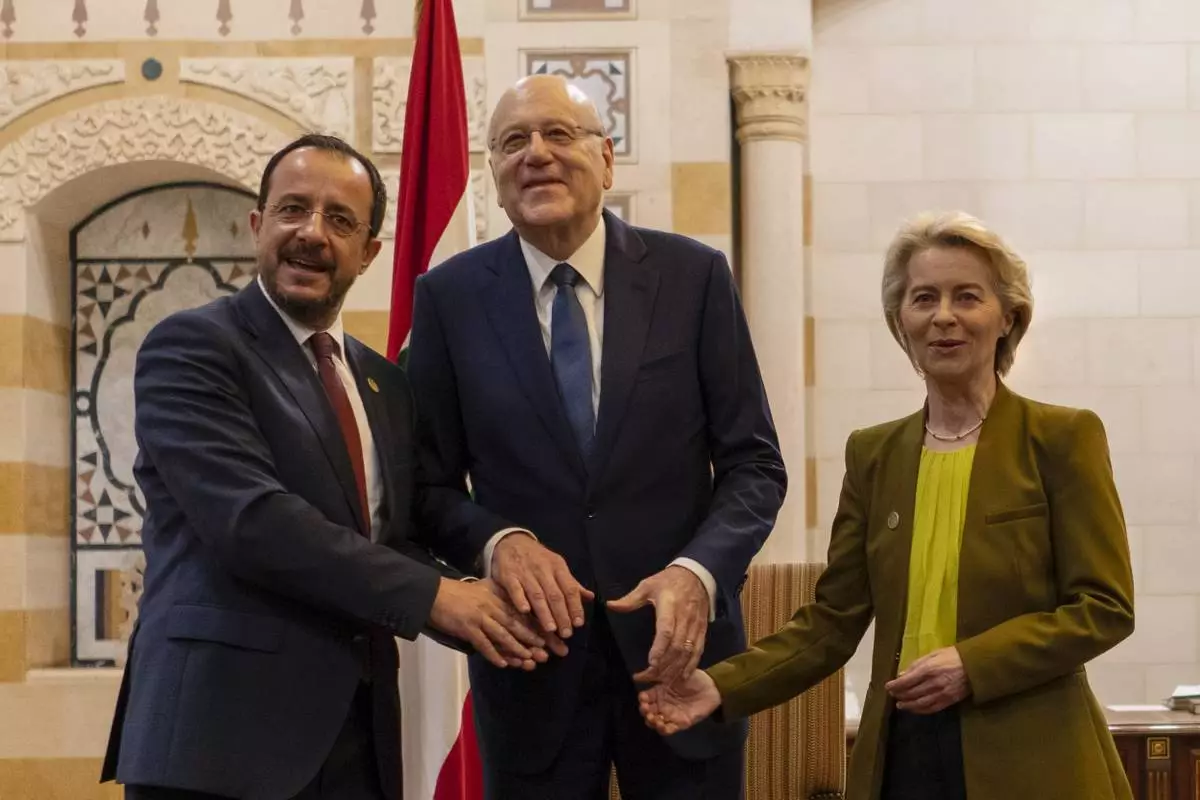
Lebanese caretaker Prime Minister Najib Mikati, center, Cyprus' President Nikos Christodoulides, left, and President of the European Commission Ursula von der Leyen pose for photograph at the government palace in Beirut, Lebanon, Thursday, May 2, 2024. (AP Photo/Hassan Ammar)
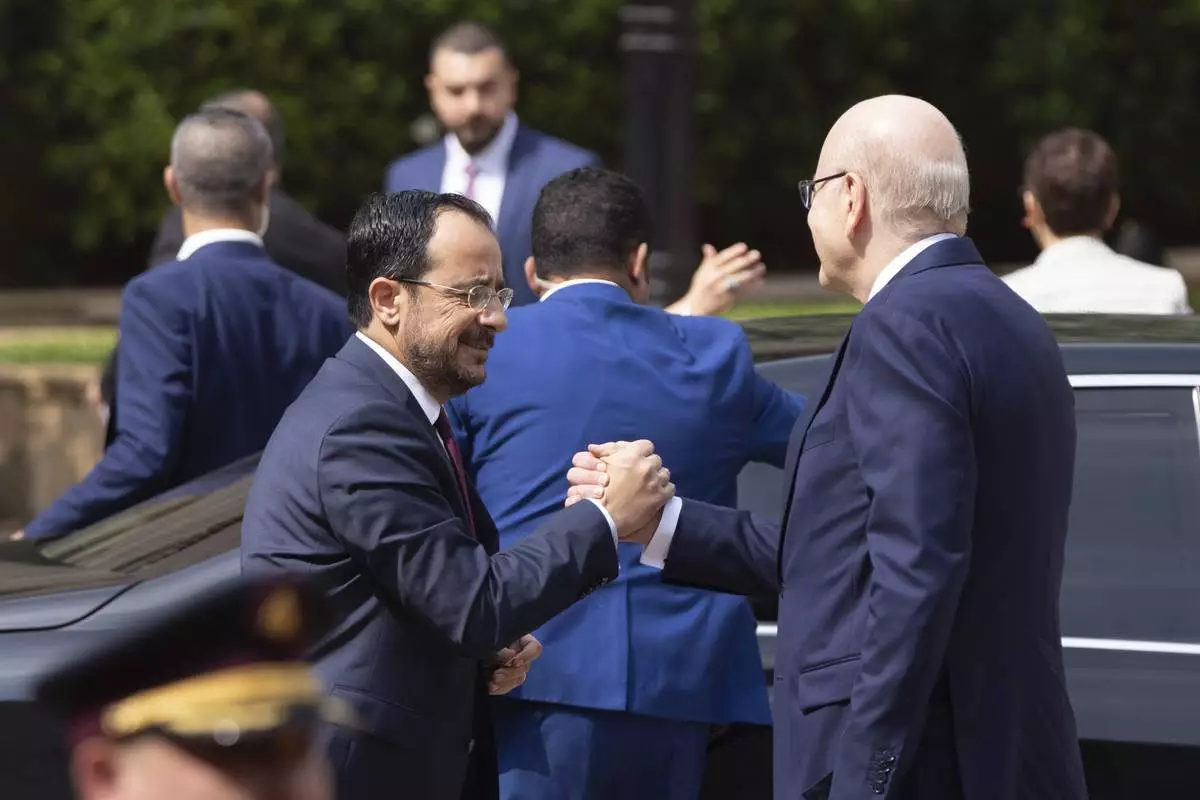
Lebanese caretaker Prime Minister Najib Mikati, right, welcomes Cyprus' president Nikos Christodoulides before their meeting at the government palace in Beirut, Lebanon, Thursday, May 2, 2024. (AP Photo/Hassan Ammar)

Cyprus' President Nikos Christodoulides, left, and President of the European Commission Ursula von der Leyen, center, review an honor guard upon their arrival to meet with the Lebanese Speaker Nabih Berri, in Beirut, Thursday, May 2, 2024. (AP Photo/Hussein Malla)

Lebanese caretaker Prime Minister Najib Mikati, center, speaks during his meeting with Cyprus' President Nikos Christodoulides, left, and President of the European Commission Ursula von der Leyen at the government palace in Beirut, Lebanon, Thursday, May 2, 2024. (AP Photo/Hassan Ammar)
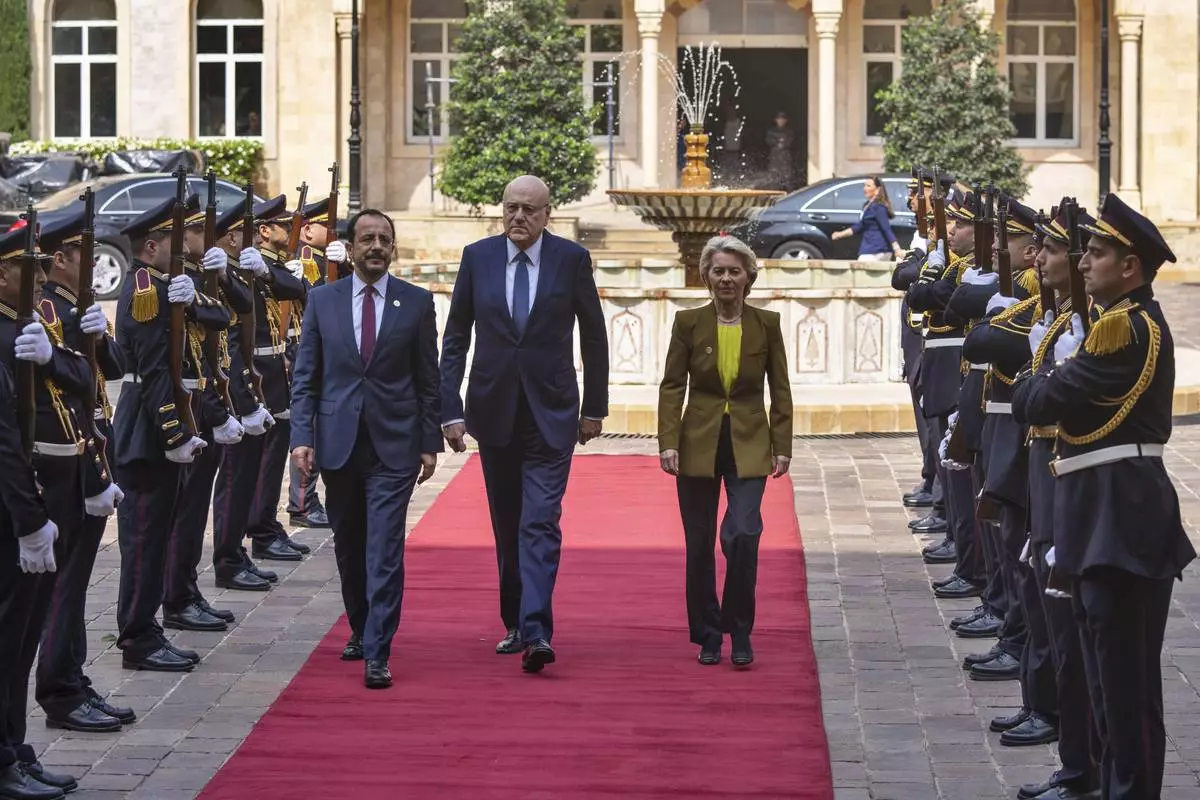
Lebanese caretaker Prime Minister Najib Mikati, center, welcomes Cyprus' President Nikos Christodoulides, left, and President of the European Commission Ursula von der Leyen at the government palace in Beirut, Lebanon, Thursday, May 2, 2024. (AP Photo/Hassan Ammar)













